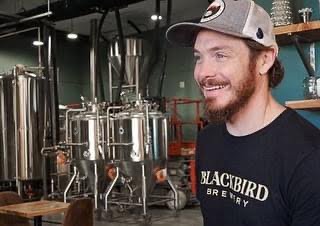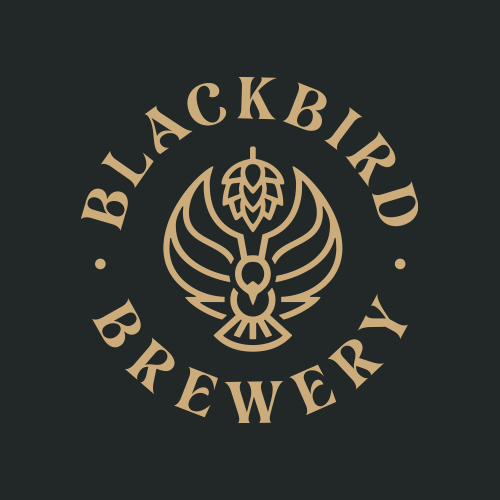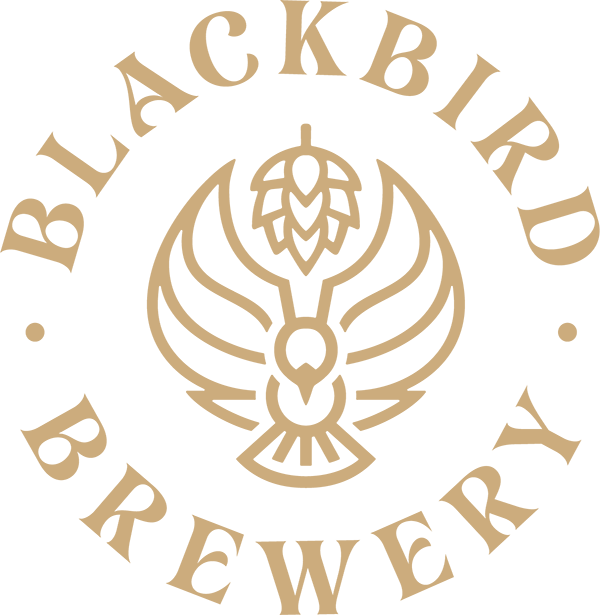
We recently sat down with Ian VanGundy, head brewer and co-owner of Blackbird Brewery, to ask the questions we’ve been hearing most often. Read on to learn about Ian’s background, what’s coming soon, and what makes the Blackbird brewing process unique.
When and what will you be brewing?
The Blackbird brewhouse comes online late January. Our first batches are designed to stretch the legs of the system so we can learn as quickly as possible how it reacts to our recipes.
- A German ‘ale’ to test our mash mixing vessel and German influenced processes with quicker results than we’ll get from our lagers.
- An IPA to test hops separation
- An Imperial Stout to test lauter tun capacity, efficiency and evaporation rate over a long duration in the boil kettle.
Immediately after, we’ll start our lager program and sprinkle in Belgians and fruited kettle sours.
What are some things you want customers to know about our brewing process?
We are excited about beers that can be elevated with longer brewing and maturation times. We’ve added a mash mixing vessel to our brewhouse to spend more time fine tuning the sugar and protein ratios in our beers, enhancing things like foam retention and flavor development in fermentation. This also allows us to play with unmalted ingredients that require more rigorous temperature steps, giving us more options for creating unique characters in certain beers.
The mashing vessel is common in Europe but rare in US breweries, giving us a special tool that helps differentiate our beers. We believe in slower cooling and longer cold rests for natural clarification and carbonation in any beer style applicable, not just lagers. We’ve added horizontal tanks which will aid in this process.
Our IPAs, stouts and fruit beers are flavor driven, meaning as intensely characterful as possible while preserving balance and drinkability. To accomplish this, we put extra consideration into sourcing ingredients, exploring new processes and following up with sensory analysis to continuously improve.
What’s the plan for canning or beer to go?
We plan to install a small canning machine this spring, hopefully not long after our first beers are finished. We’ll try to put as many of our creations into cans as possible.
What sets Blackbird Brewery apart from other breweries when it comes to our process?
We’re an artisanal brewery focused on the taproom experience. Without distribution schedule constraints, we have more patience in our brewing process and control over freshness. Without distribution costs we can invest more heavily into ingredients. This allows us to focus on making our beers at the highest level possible.
Will you tell us a little about your background including your studies in Germany?
I’ve been a brewer as long as I’ve been an adult. My first batch of homebrew was a Czech Pilsner in my studio apartment when I was 18. That was 2003. I became a regular at the homebrew shop until they eventually hired me when I turned 21. Two years later I attended Siebel Institute’s World Brewing Academy, a program where you spend half your time at their nearly 150-year-old brewing school in Chicago and the other half at Doemens Academy just outside of Munich, Germany.
The diploma I received helped land a job a month before the opening of Lonerider Brewing in Raleigh where I worked as head brewer until 2013, earning some notable awards like a GABF Gold for Sweet Josie in 2010. Next, I joined White Street to help build their production brewery in Youngsville and worked as their head brewer until 2016, helping fine tune the Kolsch to receive the World Beer Cup Gold in 2014 and GABF Gold for Scottish in 2016. I then got an opportunity to start a brewery from scratch, R&D Brewing in Raleigh. I built a pilot and production brewery there and developed their top selling beers like Seven Saturdays IPA and Storm Brew for the Carolina Hurricanes.
After some life changing experiences like my wife’s life-threatening delivery of our child, and world changing experiences like covid, I fell out of love with larger scale production brewing and became more attracted to the romance of a small artisanal brewery. Many of the practices I learned about in Germany I never employed due to equipment or time limitations, and I was still brewing to the rule of thumbs of an American craft brewer.
At Blackbird I’ve fully customized the equipment with an intention to take a step back and dust off the old books and traditional practices, but also combine that with some of the newest discoveries that have just unfolded in the last few years. We’ll try to hit the mark on some classic styles, but I think over time as we make things a little better, the beers will morph into something really special and unique to us.


